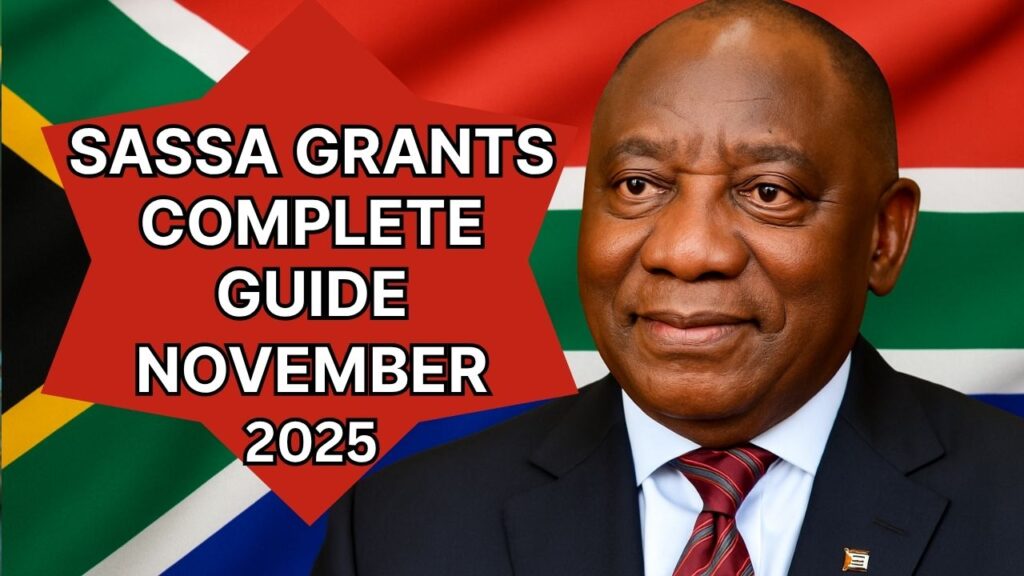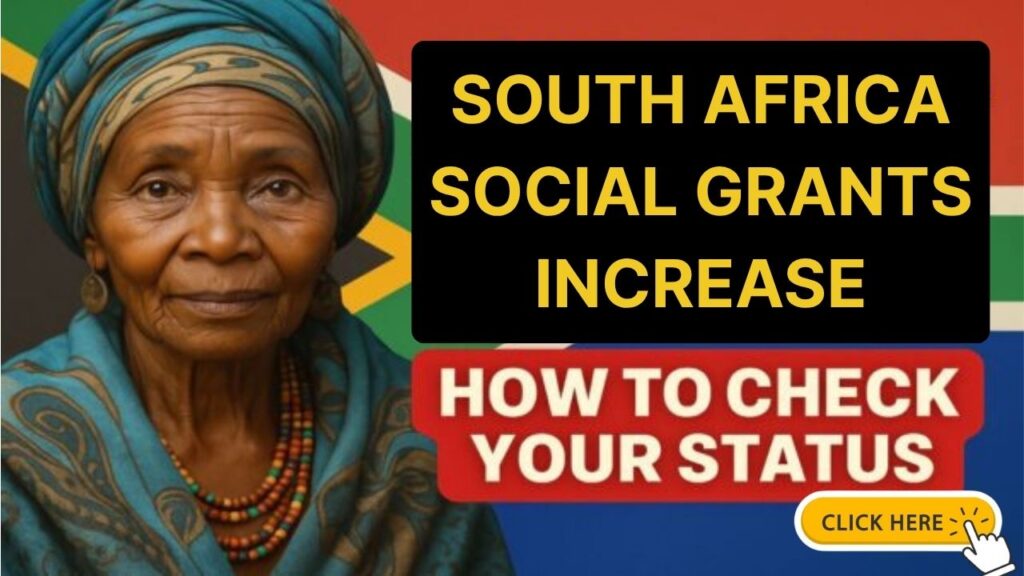South African Social Security Agency grants are a lifeline for more than 18 million people. From November 2025, SASSA will implement a small increase across several grants to help households cope with higher food, transport, and utility prices. While the adjustments are modest, they still lighten the load for older persons, persons with disabilities, and families caring for children. This guide explains who qualifies, what the new amounts are, how and when payments will be made, and what to do if something goes wrong.
Table of Contents
What Is Changing in November 2025

Beginning in November 2025, SASSA will apply the following increases:
- Older Persons Grant increases from R2,180 to R2,210
- Disability Grant increases from R2,180 to R2,210
- Child Support Grant increases from R530 to R540
- Foster Care Grant increases from R1,180 to R1,200
These changes are intended to help grant recipients absorb part of the ongoing rise in living costs. Although the amounts are small, they provide steady monthly support that can be used for groceries, transport to school or clinic visits, electricity, and other essentials.
Summary Table
Item |
Key Details |
|---|---|
Country |
South Africa |
Programme |
SASSA Social Grants Adjustment November 2025 |
Grants Affected |
Older Persons Grant, Disability Grant, Child Support Grant, Foster Care Grant |
New Monthly Amounts |
Older Persons and Disability: R2,210. Child Support: R540. Foster Care: R1,200 |
Increase Size |
R30 for Older Persons and Disability, R10 for Child Support, R20 for Foster Care |
First Payout Month |
November 2025 according to the calendar below |
Primary Collection Channels |
Direct bank deposit, Postbank outlets and ATMs, participating retailers such as Shoprite and Pick n Pay |
Eligibility Basics |
South African residency, valid ID, means test for income related grants, qualifying age or medical assessment where relevant |
Official Website |
Who Qualifies for Each Grant
SASSA evaluates eligibility using the Social Assistance framework. Below is a quick guide. Apply only for the grant that fits your situation, since each grant has specific requirements and documents.
Older Persons Grant
- Who: South African citizens, permanent residents, or refugees aged 60 and above who pass the means test
- Key documents: South African ID or valid alternative, proof of income or assets, marital status documents if applicable
- Note: Amounts do not change by age tier in this November 2025 update. If you already receive the older persons grant, the increase should reflect automatically.
Disability Grant
- Who: Adults with a medically assessed disability that prevents them from working for more than six months, who pass the means test
- Key documents: ID, recent medical assessment by a state appointed or recognised medical professional, proof of income and assets
- Note: Temporary disability grants require periodic reassessment.
Child Support Grant
- Who: Primary caregivers of children under 18 who meet the means test and can demonstrate primary care
- Key documents: Caregiver ID, child’s birth certificate, proof of school enrolment where required, proof of primary care
- Note: The grant is per child. The November 2025 increase brings the amount to R540 per eligible child.
Foster Care Grant
- Who: Caregivers with a valid court order placing the child in foster care
- Key documents: Court order, caregiver ID, child’s birth certificate, relevant social worker reports
- Note: Review dates must be met to avoid lapses.
November 2025 Payment Schedule and Channels
To reduce queues and ensure secure transactions, SASSA staggers payments. For November 2025, the indicative schedule is:
Grant Type |
Previous Amount (R) |
New Amount (R) |
Increase (R) |
Payment Date in November 2025 |
|---|---|---|---|---|
Older Persons Grant |
2,180 |
2,210 |
30 |
15 November 2025 |
Disability Grant |
2,180 |
2,210 |
30 |
16 November 2025 |
Child Support Grant |
530 |
540 |
10 |
17 November 2025 |
Foster Care Grant |
1,180 |
1,200 |
20 |
18 November 2025 |
Where and how to collect
- Direct deposit: Funds are deposited into your bank account. This is the most convenient option because you can withdraw at your own time.
- Postbank: Withdraw at Postbank branches and ATMs.
- Participating retailers: Shoprite, Pick n Pay, and other approved stores can process withdrawals, usually at the till or money counter.
Important: Always keep your bank details and mobile number updated with SASSA to avoid payment delays. If you switch banks, file the change early, since account verification can take time.
What the Increase Means for Households
Even small monthly adjustments make a difference. A household with one older person and two children receiving the Child Support Grant could see around R50 more per month under the new amounts. This can be the cost of a taxi ride to a clinic, a loaf of bread and milk for breakfast, or a portion of prepaid electricity. For millions of households, predictable monthly transfers are essential for budgeting and avoiding high cost debt.
How to Prepare Before the Payout Dates
- Verify your grant status
Use the SASSA website, helplines, or visit your nearest office to confirm that your grant is active and that there are no outstanding reviews. - Check bank details
Ensure your account name matches your ID and that the account is open and active. If you use a retailer withdrawal option, bring your card and a valid ID. - Keep your documents handy
A lost card or expired ID can slow you down. Keep certified copies where possible. - Avoid scams
SASSA officials will never ask for your PIN or full card details. Do not share OTP codes. Report suspicious messages to official channels.
What To Do If Payment Is Late or Missing
- Step 1: Check your balance using your bank app or at an ATM.
- Step 2: If there is no deposit, contact your bank to confirm whether a payment is pending.
- Step 3: Reach out to SASSA through the official website, call centre, or your local office. Be ready with your ID number, grant type, and banking details for verification.
- Step 4: If your card is lost or compromised, request a replacement immediately and update any security information.
Frequently Asked Questions
1. When will the new amounts start showing in my account
From the scheduled dates in November 2025 shown in the table. If your payment does not reflect by the end of your grant’s date, contact SASSA or your bank.
2. Do I need to reapply to get the increase
No. If your grant is active and your details are correct, the increase should apply automatically.
3. Can I change from retailer collection to direct bank deposit
Yes. You can request a change at SASSA, but allow time for verification and processing. Bring your ID and proof of bank account.
4. Why is my grant amount different from my neighbour’s
Some grants can include top ups or differ based on specific status, court orders, or review outcomes. Confirm your exact entitlement with SASSA.
5. How do I protect myself from fraud around payday
Keep your card and PIN secure, do not share OTP codes, and only follow instructions from official SASSA channels or in person at an office.
Conclusion
SASSA’s November 2025 adjustment may be small, yet it matters. With R2,210 for Older Persons and Disability Grants, R540 for the Child Support Grant, and R1,200 for the Foster Care Grant, households gain a little more flexibility for essentials. To make the most of the update, keep your details current, understand your payment date and collection channel, and use official SASSA contact points if you need help. Regular, reliable transfers are the backbone of household budgeting for millions of South Africans. This increase keeps that backbone a little stronger.
Official Website
For verified updates, eligibility checks, and contact details, visit https://www.sassa.gov.za
For More Information Click HERE











